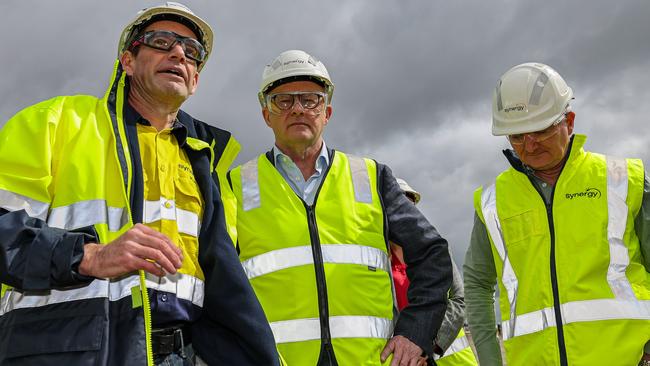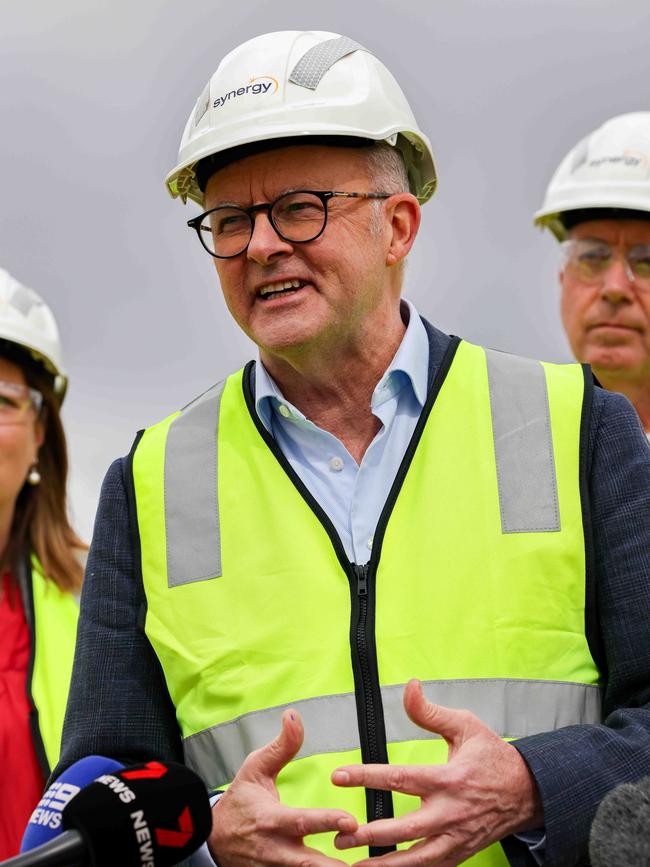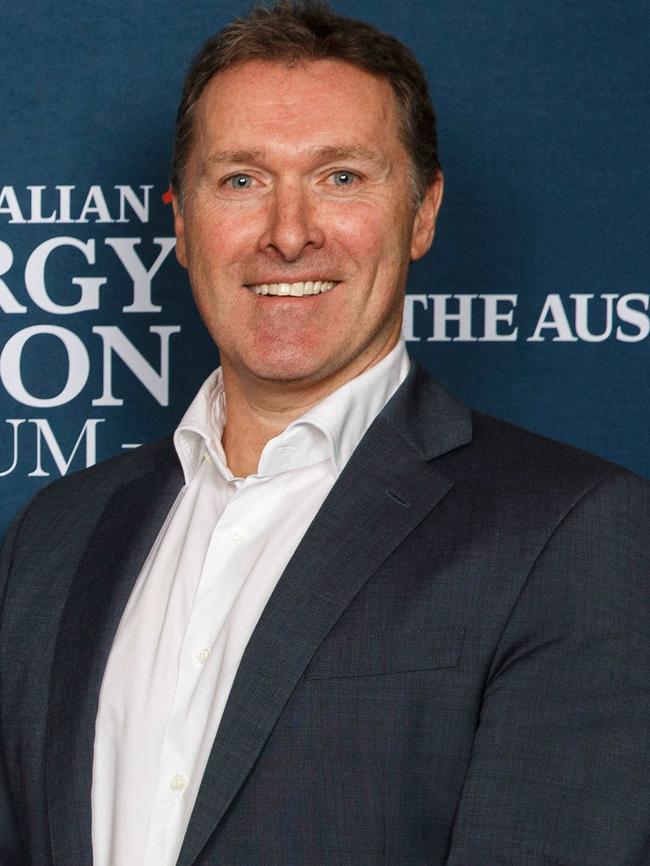Labor hits nuclear attack button as gas crisis looms
Australia will have to import LNG, leading to likely cost increases and ‘hoping and praying’ to get through next winter, industry executives warn, as Labor ramps up the energy war.

Australia will have to import liquefied natural gas to back up its precarious east coast supplies, leading to likely cost increases and “hoping and praying” to get through next winter, industry executives have warned, as Labor ramps up the energy war over the Coalition’s nuclear plans.
Anthony Albanese and Energy Minister Chris Bowen on Sunday pushed their plan for a renewable energy future with a proposal to build a battery project in Collie in southwest Western Australia, which the Prime Minister said would provide “enough power for literally hundreds of thousands of homes”.
The industrial town is also where the Coalition plans to build a small modular reactor by 2050 as part of its blueprint to build nuclear power plants at up to seven sites across the nation.
But Mr Bowen claimed the Coalition’s SME proposal would fail to meet the state’s electricity demands as it could only produce 1500 megawatt hours of power, less than the current 2000 megawatt hours produced by the Muja coal-fired plant due to shut down in 2027. “Peter Dutton’s nuclear plans for Muja Power Station would not have access to enough water to be able to deliver anything close to the energy the people of WA need,” Mr Bowen said on Sunday.

“It’s up to Peter Dutton to explain where the water is going to come from and why he would risk significant investment in WA’s energy industry to chase an expensive pipe dream that can’t keep the lights on.”
Mr Albanese warned the Coalition’s nuclear energy plan had come “too late”, was “too expensive” and wouldn’t “provide enough energy for what Western Australia needs”.
“What we need to do is to have real investment, with real dollars, creating real jobs, creating real energy now as we transition because coal-fired power stations are shutting,” he said.
“There’s no costings for the project here, there’s no costings for Peter Dutton’s nuclear plans going forward.”
Energy and cost of living are two key battlegrounds between the major parties leading into the next election, due by May.
Opposition climate change and energy spokesman Ted O’Brien visited Collie last month to spruik the Coalition’s plan for the town, which he said would be left exposed after its two coal-fired power stations were shut down “prematurely” under the Labor government.
Under a Coalition government, the power stations’ lives would be extended until nuclear power plants could replace them.
“1200 local jobs will be lost when Labor shuts the two Collie power stations down prematurely,” Mr O’Brien said last month. “Only the Coalition has a plan to re-energise the local economy with our cheaper, cleaner, and consistent energy plan.”
The cost of building a large-scale nuclear energy plant came to $8.6bn, under modelling by the CSIRO, which found such a project would also take about 15 years to complete.
But Mr O’Brien in May asked the agency to rerun its modelling, arguing there were three flawed assumptions in the CSIRO’s report that meant its conclusions were not accurate.
The country’s energy market operator warned this year that the east coast was facing a tight 2025 as traditional energy supplies ran low.
The Australian revealed last week the industry was fearful the situation was more precarious than official forecasts revealed, because a critical pipeline NSW and Victoria relied on during recent winters was poised to run at near capacity for nearly all of next year, leaving no leeway in the event of a major coal power station suffering an outage.
Adam Watson, chief executive of ASX-listed APA Group – one of the nation’s biggest energy operators, running $25bn of gas, electricity and renewable infrastructure around the country – said it was likely Australia, one of the world’s largest gas exporters, would have to import LNG after years of failing to bolster domestic supplies.


Mr Watson, one of the strongest critics of Australia importing LNG from countries such as Qatar, said: “It looks like LNG imports are the only alternative left.”
Industry sources said importing gas was likely to inflate domestic prices at least in the short term.
Frank Calabria, chief executive of Origin Energy, the country’s largest electricity and gas retailer, said east coast supplies were depleting quickly and imports shaped as the viable solution. But he added such a move would end the disconnection between domestic prices and international benchmarks.
“Our view is that LNG imports will play an increasing role in those southern states,” he said. “It certainly strengthens international linkage pricing.”
Domestic gas prices have traditionally been cheaper than global benchmarks, but importing LNG shipments would lead to local prices matching overseas levels. Higher domestic gas prices would be a hammer blow to businesses – and to households, which have seen gas bills already jump around 10 per cent this year on the back of rising wholesale prices.
Additional reporting: Jack Quail


To join the conversation, please log in. Don't have an account? Register
Join the conversation, you are commenting as Logout